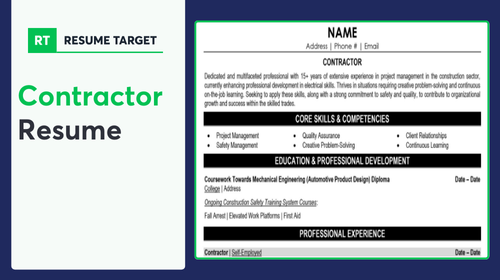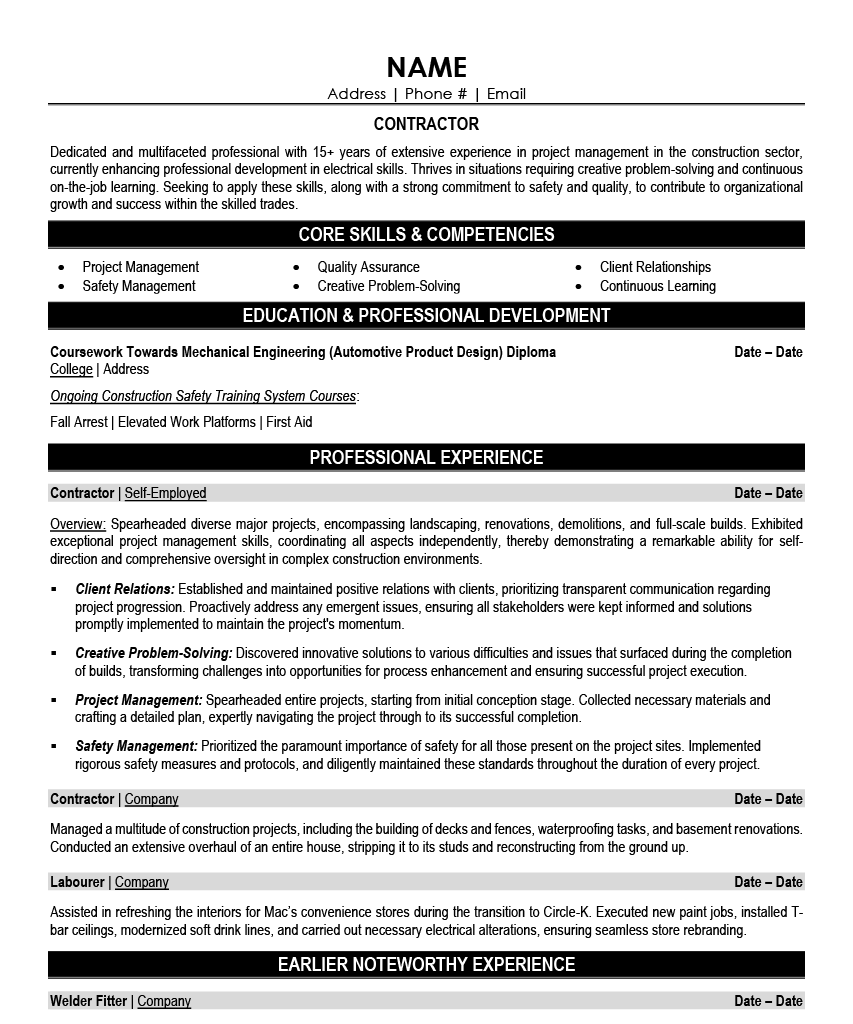

Building impressive structures is your expertise, but building an impressive resume stumps many construction managers. Managing million-dollar projects is complex, yet describing your impact shouldn't be.
Are you struggling to showcase your leadership of multiple contractors, budget oversight, and project milestones? Your resume needs to demonstrate both your technical knowledge and your ability to deliver projects on time and under budget.
Resume Target helps construction managers translate their field experience into powerful achievements. We'll show you how to highlight your project management skills, safety record, and bottom-line results to land more interviews with top construction firms.

As an independent professional, a contractor takes charge of projects and services while maintaining the freedom to operate under their own management, essentially becoming their own boss in their chosen field of expertise.
Whether you're renovating homes, providing consulting services, or managing construction projects, your role as a contractor involves wearing multiple hats - from project planning and client communication to resource management and quality control - all while maintaining the flexibility to choose your projects and set your own schedule.
If you're considering the contractor path, you'll find it offers unique opportunities for professional growth, from starting as a specialized service provider to potentially building your own contracting company, with the potential to scale your business according to your ambitions and market demands.
Let's talk about the exciting earning potential in the contracting field! As a contractor, your skills and expertise can lead to impressive compensation, with opportunities to significantly increase your earnings as you gain experience and specialize in high-demand areas. The construction and renovation boom means there's never been a better time to consider this rewarding career path.
Figures from: Finturf
Want to build a successful contractor career? Start by mastering core skills and industry knowledge, then progress through increasingly complex projects and responsibilities while building your professional network.
Beyond basic construction knowledge, advancing your contractor career requires a strategic mix of technical expertise and business acumen.
- Project Management Software Proficiency - Building Code and Compliance Knowledge - Financial Estimation and Budgeting - Leadership and Team ManagementBreaking into contracting is accessible through entry-level construction roles like general laborer or carpenter's assistant, where you'll gain hands-on experience while learning the fundamentals of the trade.
To advance from entry-level positions to becoming a successful contractor, you'll need to develop key competencies including project management and technical skills while building your professional network.
Requirements from TryToolbox
With 69% of firms planning to hire and strong public sector growth, contractors are finding hot markets across the US.
Figures from Home Builders Institute Labor Market Report
Struggling to showcase your diverse project experience, specialized skills, and successful contract work in a way that catches potential clients' attention? This comprehensive, section-by-section guide will help you craft a contractor resume that highlights your expertise and lands you more projects.
As a contractor who excels at bringing construction projects to life, you might find that capturing your diverse skillset in a few powerful sentences feels more challenging than coordinating multiple subcontractors on a complex build.
While you're an expert at managing timelines, budgets, and building relationships with clients and crews, translating these valuable skills into a compelling summary that catches a potential client's attention requires a different type of blueprint - one that showcases your professional value in seconds.
How would you describe your overall expertise across different types of construction projects and what makes your approach to project management unique?
Reason: This helps establish your breadth of experience while highlighting your personal methodology, giving potential clients insight into both your capabilities and work style.
What combination of licenses, certifications, and specialized skills sets you apart as a contractor in your primary market area?
Reason: This question helps frame your professional credentials in a way that demonstrates market readiness and compliance, while emphasizing your competitive advantages.
How would you characterize your ability to balance quality, timeline management, and budget constraints across your projects?
Reason: This helps articulate your core value proposition as a contractor by addressing the three main concerns of any client or employer, showing you understand what matters most in the industry.
As a contractor, you need to showcase both your hands-on technical abilities and your business management expertise, from project estimation to client relations.
Your resume should highlight specialized trade skills (like carpentry, electrical, or remodeling), along with essential contractor qualifications such as license credentials, safety protocol knowledge, and experience with building codes and regulations.
Showcase your versatile contracting expertise by organizing your experience into three powerful sections: a concise role overview highlighting your specialties, measurable achievements that demonstrate project success, and core responsibilities that spotlight your hands-on capabilities.
Many contractors struggle to effectively showcase their diverse project portfolio and quantifiable results in a way that stands out to potential clients and employers. Transform your experience into compelling proof of value by connecting each achievement to specific revenue gains, cost reductions, and project completion metrics that demonstrate your reliable project management expertise.
The responsibilities section demonstrates how Contractors manage projects, coordinate teams, and deliver results beyond basic construction tasks. Your role description should clearly show hiring managers how you connect project execution to client satisfaction and business success.
Your construction and contracting credentials demonstrate your expertise and commitment to industry standards. Focus on highlighting your most current licenses, safety certifications, and any specialized training that directly relates to your contracting specialty.
Now that you've built a strong foundation using Resume Target's proven resume writing guidelines, you're ready to transform your base resume into a powerful tool for landing contractor positions.
While many contractors focus solely on customizing their cover letters, tailoring your resume for each specific contracting opportunity is equally crucial for showcasing your relevant skills and experience.
A customized contractor resume not only helps you navigate through ATS systems by incorporating the right keywords, but it also demonstrates to hiring managers that your specific contracting expertise aligns perfectly with their project needs.
Ready to stand out from other contractors? Let's transform your resume into a targeted marketing document that proves you're the exact solution they're looking for!
Don't let a lack of professional experience hold you back from pursuing your contracting career! Your journey into contracting can start strong by showcasing your hands-on skills, relevant training programs, and any DIY or volunteer construction projects you've completed.
Focus on highlighting your technical knowledge, safety certifications, and practical building experience to create a compelling resume.
Check out our Student Resume Writing Guide for expert tips on formatting and presenting your qualifications effectively.
Your entry-level contractor resume summary is your chance to showcase hands-on experience from apprenticeships, relevant certifications, and practical skills that make you valuable to potential employers.
Focus on highlighting specific construction projects you've assisted with, tools you can operate, and safety protocols you've mastered - these practical elements matter more than years of experience.
"Detail-oriented and safety-conscious contractor with foundational experience gained through a 1-year apprenticeship program and hands-on residential construction projects. Proficient in blueprint reading, power tool operation, and OSHA safety standards, with successful completion of 3 home renovation projects under senior contractor supervision. Demonstrated ability to effectively coordinate with subcontractors and maintain project timelines while adhering to building codes. Seeking to leverage strong technical foundation and proven work ethic to deliver quality construction results as a junior contractor."
Now's your chance to showcase the valuable training and certifications that make you stand out as a qualified contractor - from formal education to specialized trade programs!
Transform your learning experiences into compelling content by highlighting relevant coursework like construction management or specific trade certifications, plus standout hands-on projects that demonstrate your practical skills, like managing a complete home renovation or leading a commercial build.
Here are some courses common to a degree/certification for Contractors: 1. **Question 1** 2. **Extracted information:** * Business, construction management, or general studies degrees [3] * Building Information Modeling, Lean Construction, Project Management, and Supervision Fundamentals [4] * Courses covering LEED and project management [5] * Bidding/Estimating, Business Math, Business Law Exam Prep, Construction Project Management Certification, Mold Services Professional Certification, and Plan Reading [1] * Financial Responsibility Course [1] * Trade exam, as well as a business and law exam [2] 3. **Source URL:** * [https://www.kapre.com/contractor?srsltid=AfmBOorI-uBTDG59LgN2ZqMunh3wpkWn3gwymMjA49dIhmg-v4oOcuoZ](https://www.kapre.com/contractor?srsltid=AfmBOorI-uBTDG59LgN2ZqMunh3wpkWn3gwymMjA49dIhmg-v4oOcuoZ) [3] * [https://www.agc.org/education](https://www.agc.org/education) [4] * [https://www.redvector.com/contractor/](https://www.redvector.com/contractor/) [5] * [https://contractortrainingcenter.com/?srsltid=AfmBOorR09ds_5C20AH4PwHB6PGjMQyR1c2Q0i3zLCAZHCFuNhKVZf0p](https://contractortrainingcenter.com/?srsltid=AfmBOorR09ds_5C20AH4PwHB6PGjMQyR1c2Q0i3zLCAZHCFuNhKVZf0p) [1] * [https://www.nextinsurance.com/blog/general-contractor-license-requirements/](https://www.nextinsurance.com/blog/general-contractor-license-requirements/) [2]Relevant Coursework: Construction Project Management | Business Law | Plan Reading | Building Information Modeling | Bidding & Estimating | Lean Construction
Key Projects:
Residential Construction Planning Project: Led a comprehensive planning and estimation project for a 2,500 sq ft single-family home, developing detailed construction timeline and budget analysis.
Commercial Renovation Simulation: Collaborated with a four-person team to develop a renovation strategy for an existing commercial space, focusing on cost-effective solutions and minimal business disruption.
Transform your hands-on experience from training programs, apprenticeships, and initial projects into powerful resume skills that showcase your readiness to tackle construction and renovation challenges with confidence.
As an entry-level contractor, your foundation in these essential skills positions you well for growth in the construction industry, where demand for qualified professionals continues to rise and opportunities for advancement are abundant.
Let's face it - trying to showcase years of hands-on experience, project management skills, and technical know-how on paper feels like building a house without blueprints.
At Resume Target, we specialize in crafting resumes that help contractors stand out in the competitive construction industry, transforming complex project histories into compelling success stories.
Our deep understanding of the construction sector means we know exactly how to highlight your ability to deliver projects on time and under budget, having helped hundreds of contractors land their ideal roles.
With construction projects ramping up across the country and competition for top positions intensifying, now is the perfect time to upgrade your professional presentation - let's build your standout resume today.
Impress any hiring manager with our Construction resume writing service. We work with all career levels and types of Construction professionals.
Learn More → Construction Resume Writing Services